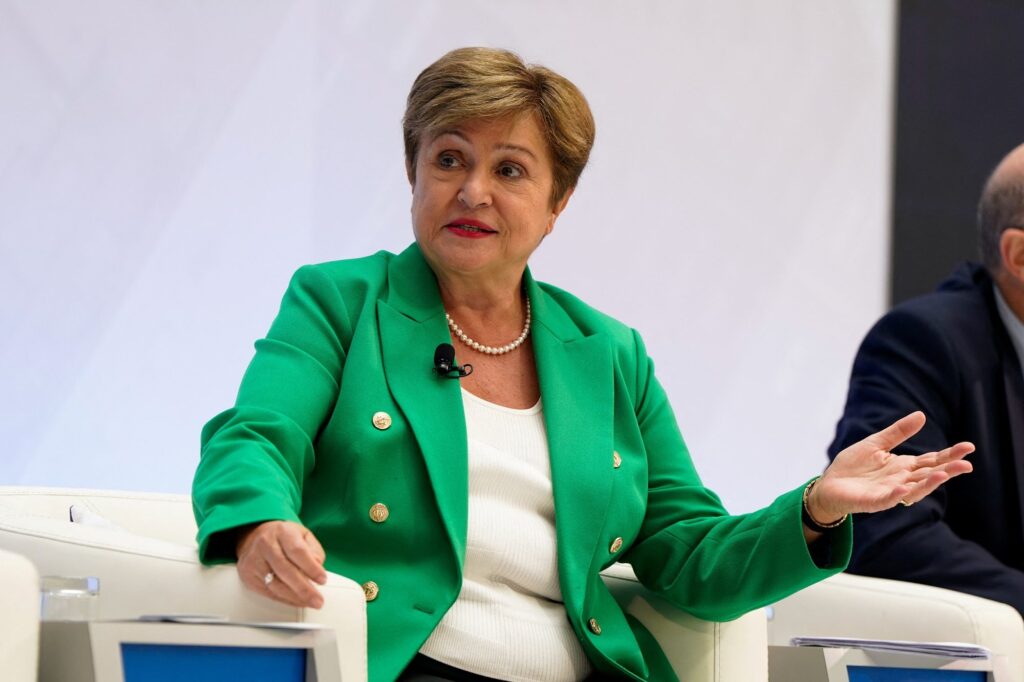IMF calls for internal GCC trade
‘A lot of praise to offer’ – IMF director
Lower oil prices have big impact
Senior International Monetary Fund officials commended Gulf states this week for their efforts to expand sources of economic growth and fiscal revenue beyond oil. They also urged more intra-GCC trade, as global commerce is roiled by steep and volatile US tariffs.
“I have a lot of praise to offer because they have been pursuing reforms and diversification of the economies,” IMF director Kristalina Georgieva said on Thursday in Washington.
“Most countries have done really well. So now they see oil growth down, but non-oil economies are still doing quite well.”
Since taking office in January, US President Donald Trump has announced tariffs on nearly all imports regardless of country of origin, stoking fears of a global recession and damping oil prices.
A recent decision by Opec+ to move forward with planned increases in crude production after holding back output for more than two years is further impacting crude prices.
Lower oil prices are the biggest vehicle of transmission of global economic volatility into the Arab Gulf states, given that the six GCC states’ bilateral trade with the US remains modest, according to Jihad Azour, the IMF director for the Middle East and Central Asia.
While each country in the region has a different breakeven level, the IMF estimates that a fall in the price of crude of $10 weakens their fiscal stance by between 2.3 and 2.7 percent of gross domestic product, Azour said during a press briefing on Thursday. It similarly affects current account balances by between 2.5 and 2.7 percent of GDP, he said.
Brent crude is trading at slightly over $66 a barrel, having fallen 12 percent so far this year.
The IMF officials said that diversification efforts across the GCC are therefore critical.
“Some countries have used the opportunity of their diversification strategy to both reduce the dependence on oil as a source of income, but also to diversify fiscally and reduce the impact of oil revenues,” Azour said. “Which we encourage other countries to focus on.”
Azour highlighted “significant improvements” made by Saudi Arabia in this domain.
“The last couple of years have been beneficial in terms of providing Saudi Arabia and other GCC countries with surplus in the fiscal [space] as well as also in the current account,” he said.
“Of course, still, the oil sector represents an important source of revenue, and it’s still also an important resource of foreign currencies.”
The IMF revised Saudi Arabia’s growth prospects downward in its latest World Economic Outlook, forecasting 3 percent growth this year versus 3.3 percent it projected in January.
Azour said that GCC countries should create trade and investment corridors with sub-Saharan Africa and Asia and, most importantly, within their immediate region and with close neighbours in North Africa and Central Asia.
Such a strategy, he said, “can help mitigate exposure to external uncertainty, enable greater risk sharing, and drive sustainable economic development”.
IMF director Georgieva said on Tuesday that she expects increasing regional engagement “in areas of the world where this makes total sense.” She cited the GCC and the Association of Southeast Asian Nations as prime examples.
“There [are obvious] benefits of stepping up trade among neighbours, creating better conditions for capital flows across borders,” she said.
Register now: It’s easy and free
AGBI registered members can access even more of our unique analysis and perspective on business and economics in the Middle East.
Why sign uP
Exclusive weekly email from our editor-in-chief
Personalised weekly emails for your preferred industry sectors
Read and download our insight packed white papers
Access to our mobile app
Prioritised access to live events
Already registered? Sign in
I’ll register later



